138 posts
Latest Posts by writersreferencez - Page 4
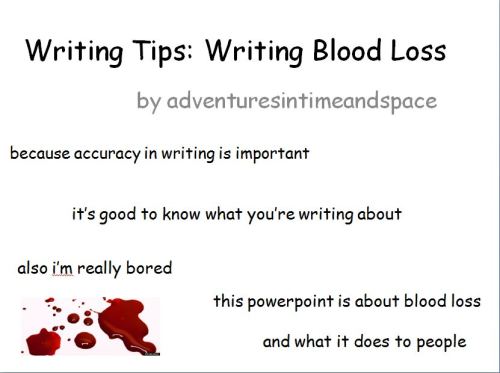
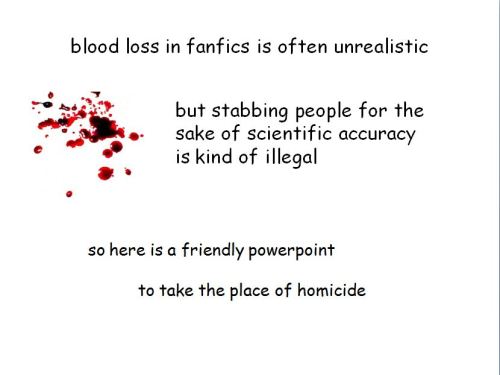

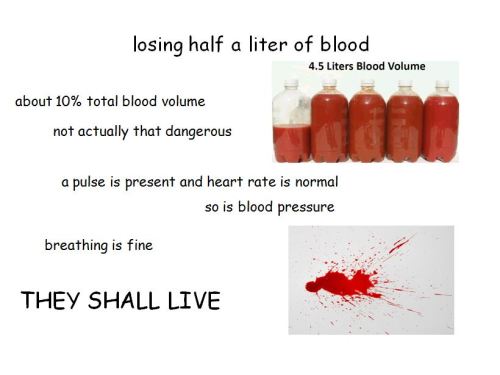
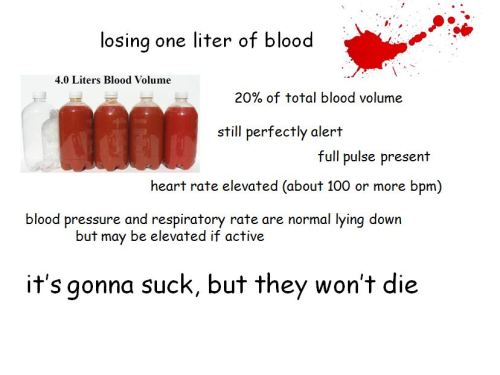
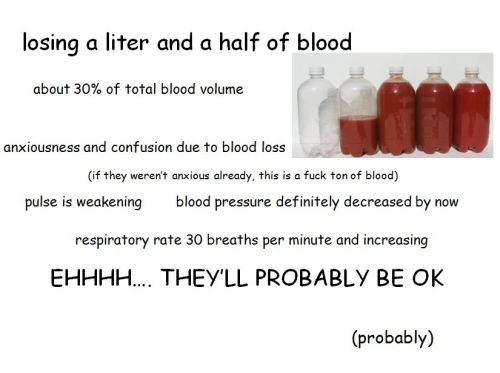



Here are some scientific facts about blood loss for all you psychopaths writers out there.
There is no reason not to love your writing. You did it. You spent time on it. Of course you should talk about it. No. It’s not boasting, nor are you self obsessed. It’s yours. You spent time on it. Not them. Post about your art. Share with everyone. Because it is amazing.
things i have to remind myself (writer edition)
writing doesn’t get easier.
sometimes you have to write for the sake of writing.
plot should be allowed to change.
the story in your mind will never perfectly translate into text and that’s okay.
characters change, they’re supposed to change.
you’re supposed to enjoy what you write.
educate yourself about the different cultures you write about.
your friends shouldn’t be your critics.
the side character you love so much? sometimes they need to be cut from the story.
write what you want to read and not what you think people want to read.
there is no age limit in publishing, you have all the time in the world.
not every idea will grow into a story, sometimes you need to let go.
love your story, because it will be just the two of you for a while.
it’s okay to not write every day, that doesn’t make you less of a writer.
Words to replace said, except this actually helps
I got pretty fed up with looking for words to replace said because they weren’t sorted in a way I could easily use/find them for the right time. So I did some myself.
IN RESPONSE TO Acknowledged Answered Protested
INPUT/JOIN CONVERSATION/ASK Added Implored Inquired Insisted Proposed Queried Questioned Recommended Testified
GUILTY/RELUCTANCE/SORRY Admitted Apologized Conceded Confessed Professed
FOR SOMEONE ELSE Advised Criticized Suggested
JUST CHECKING Affirmed Agreed Alleged Confirmed
LOUD Announced Chanted Crowed
LEWD/CUTE/SECRET SPY FEEL Appealed Disclosed Moaned
ANGRY FUCK OFF MATE WANNA FIGHT Argued Barked Challenged Cursed Fumed Growled Hissed Roared Swore
SMARTASS Articulated Asserted Assured Avowed Claimed Commanded Cross-examined Demanded Digressed Directed Foretold Instructed Interrupted Predicted Proclaimed Quoted Theorized
ASSHOLE Bellowed Boasted Bragged
NERVOUS TRAINWRECK Babbled Bawled Mumbled Sputtered Stammered Stuttered
SUAVE MOTHERFUCKER Bargained Divulged Disclosed Exhorted
FIRST OFF Began
LASTLY Concluded Concurred
WEAK PUSY Begged Blurted Complained Cried Faltered Fretted
HAPPY/LOL Cajoled Exclaimed Gushed Jested Joked Laughed
WEIRDLY HAPPY/EXCITED Extolled Jabbered Raved
BRUH, CHILL Cautioned Warned
ACTUALLY, YOU’RE WRONG Chided Contended Corrected Countered Debated Elaborated Objected Ranted Retorted
CHILL SAVAGE Commented Continued Observed Surmised
LISTEN BUDDY Enunciated Explained Elaborated Hinted Implied Lectured Reiterated Recited Reminded Stressed
BRUH I NEED U AND U NEED ME Confided Offered Urged
FINE Consented Decided
TOO EMO FULL OF EMOTIONS Croaked Lamented Pledged Sobbed Sympathized Wailed Whimpered
JUST SAYING Declared Decreed Mentioned Noted Pointed out Postulated Speculated Stated Told Vouched
WASN’T ME Denied Lied
EVIL SMARTASS Dictated Equivocated Ordered Reprimanded Threatened
BORED Droned Sighed
SHHHH IT’S QUIET TIME Echoed Mumbled Murmured Muttered Uttered Whispered
DRAMA QUEEN Exaggerated Panted Pleaded Prayed Preached
OH SHIT Gasped Marveled Screamed Screeched Shouted Shrieked Yelped Yelled
ANNOYED Grumbled Grunted Jeered Quipped Scolded Snapped Snarled Sneered
ANNOYING Nagged
I DON’T REALLY CARE BUT WHATEVER Guessed Ventured
I’M DRUNK OR JUST BEING WEIRDLY EXPRESSIVE FOR A POINT/SARCASM Hooted Howled Yowled
I WONDER Pondered Voiced Wondered
OH, YEAH, WHOOPS Recalled Recited Remembered
SURPRISE BITCH Revealed
IT SEEMS FAKE BUT OKAY/HA ACTUALLY FUNNY BUT I DON’T WANT TO LAUGH OUT LOUD Scoffed Snickered Snorted
BITCHY Tattled Taunted Teased
Actually
The question I get the most is how I write characters that feel like real people.
Generally when I’m designing a human being, I deconstruct them into 7 major categories:
1. Primary Drive 2. Fear: Major and Secondary 3. Physical Desires 4. Style of self expression 5. How they express affection 6. What controls them (what they are weak for) 7. What part of them will change.
1. Primary Drive: This is generally related to the plot. What are their plot related goals? How are they pulling the plot forward? how do they make decisions? What do they think they’re doing and how do they justify doing it. 2. Fear: First, what is their deep fear? Abandonment? being consumed by power? etc. Second: tiny fears. Spiders. someone licking their neck. Small things that bother them. At least 4. 3. Physical desires. How they feel about touch. What is their perceived sexual/romantic orientation. Do their physical desires match up with their psychological desires.
4. Style of self expression: How they talk. Are they shy? Do they like to joke around and if so, how? Are they anxious or confident internally and how do they express that externally. What do words mean to them? More or less than actions? Does their socioeconomic background affect the way they present themselves socially? 5. How they express affection: Do they express affection through actions or words. Is expressing affection easy for them or not. How quickly do they open up to someone they like. Does their affection match up with their physical desires. how does the way they show their friends that they love them differ from how they show a potential love interest that they love them. is affection something they struggle with?
6. What controls them (what they are weak for): what are they almost entirely helpless against. What is something that influences them regardless of their own moral code. What– if driven to the end of the wire— would they reject sacrificing. What/who would they cut off their own finger for. What would they kill for, if pushed. What makes them want to curl up and never go outside again from pain. What makes them sink to their knees from weakness or relief. What would make them weep tears of joy regardless where they were and who they were in front of.
7. WHAT PART OF THEM WILL CHANGE: people develop over time. At least two of the above six categories will be altered by the storyline–either to an extreme or whittled down to nothing. When a person experiences trauma, their primary fear may change, or how they express affection may change, etc. By the time your book is over, they should have developed. And its important to decide which parts of them will be the ones that slowly get altered so you can work on monitoring it as you write. making it congruent with the plot instead of just a reaction to the plot.
That’s it.
But most of all, you have to treat this like you’re developing a human being. Not a “character” a living breathing person. When you talk, you use their voice. If you want them to say something and it doesn’t seem like (based on the seven characteristics above) that they would say it, what would they say instead?
If they must do something that’s forced by the plot, that they wouldn’t do based on their seven options, they can still do the thing, but how would they feel internally about doing it?
How do their seven characteristics meet/ meld with someone else’s seven and how will they change each other?
Once you can come up with all the answers to all of these questions, you begin to know your character like you’d know one of your friends. When you can place them in any AU and know how they would react.
They start to breathe.
How it feels to be stabbed

Getting stabbed is an experience that no one in their right mind would want to have. But, what if you do get stabbed? What would that feel like?
It usually feels like you’re being punched.
The description of being punched really hard comes up a lot when people describe the experience. One woman said she didn’t even realize she was being stabbed, she just thought her attacker was punching her as hard as he could. Many people don’t feel the actual puncturing, just the force of the knife hitting them.
You might feel nothing at all.
This wasn’t as common as the feeling of being hit, but some people said they literally felt nothing. One person said they felt nothing, but their brain started racing and their fight or flight kicked in. Another didn’t realize someone stabbed them until they saw that they were bleeding profusely.
Occasionally, it feels like you got shocked.
A few stab wound survivors described it as a very quick, but powerful, electric shock. One person described it as static electricity, while another said it was like lightening hitting them. The pain of the initial shock goes away as quickly as it occurred.
Eventually, over time, it’s probably going to hurt.
Of course the location of the stab wound effects how much it would hurt. Getting stabbed in the arm isn’t going to hurt as badly as a stab that punctured a lung. But after a while, you will most likely feel some pain. If the person wiggles the knife while it’s still in you, the pain may be more intense.
If you’re a writer, stop scrolling, and read this!!
I refuse to let anyone give up writing because they get discouraged. Be it because their story doesn't get enough notes, or because they think they're no good. Because that's completely up to perception. I look at my writing and think, "that's not too great." Especially when I compare it to certain others’, honestly. But that just tells me that I need to strive to be better. I need to strive to improve my writing style.
For those of you reading this that are thinking about quitting writing:
Don't!! Trust me, shit happens. I cannot tell you how many times I've lost things I was writing because of bullshit. Be it computer crashes, hardware glitches that destroyed all my files, or the entire fucking document becoming corrupt for no damn reason.
Honestly?I've probably lost years of work in total due to bullshit. And yeah, it was discouraging! Sometimes, it made me take entire breaks from writing, ultimately leading to me losing interest in the project because I lost interest in the fandom. But in the end, I always came back to writing. And you know what I find? What I write the second time is sometimes better that the first.
Once I rewrote something entirely because the file got corrupted. Well, I managed to restore the data, and reread it. I'll admit that there were some aspects that I forgot to put back in, but ultimately, I decided that the second writing was written better, had better word choice, and better story flow.
The worst thing you can ever do to yourself is write for numbers of notes.
You should write for your audience, yes, but you shouldn’t write something because people like it. Write because it’s fun! Write in order to improve! Writing is one of those things that always, always, always improves the more you do it, even if you're just rewriting the same thing.
But if you’re writing something that is uninspiring to you, it’s bound to come out lackluster to you, the creator, even if it doesn’t come off that way to your audience.
And if something doesn’t get too many notes, don’t get discouraged! Keep on writing! Write because it’s fun, not because it’s expected. Unless of course you have a school project, but I’m talking about fictional writing here.
Don’t let unfortunate circumstances or a measly four notes on your chapter discourage you from writing what you want. Because you will always improve your works! Make yourself better! Make that image in your brain better. Sometimes an artist must step away from the canvas to find more colors for their painting.
If you write a strong character, let them fail.
If you write a selfless hero, let them get mad at people.
If you write a cold-heated villain, let them cry.
If you write a brokenhearted victim, let them smile again.
If you write a bold leader, let them seek guidance.
If you write a confident genius, let them be wrong, or get stumped once in a while.
If you write a fighter or a warrior, let them lose a battle, but let them win the war.
If you write a character who loses everything, let them find something.
If you write a reluctant hero, give them a reason to join the fight.
If you write a gentle-hearted character who never stops smiling, let that smile fade and tears fall in shadows.
If you write a no one, make them a someone.
If you write a sibling, let them fight and bicker, but know that at the end of the day they’ll always have each other’s back.
If you write a character, make them more than just a character; give them depth, give them flaws and secrets, and give them life.
Some advice for when you’re writing and find yourself stuck in the middle of a scene:
kill someone
ask this question: “What could go wrong?” and write exactly how it goes wrong
switch the POV from your current character to another - a minor character, the antagonist, anyone
stop writing whatever scene you’re struggling with and skip to the next one you want to write
write the ending
write a sex scene
use a scene prompt
use sentence starters
read someone else’s writing
Never delete. Never read what you’ve already written. Pass Go, collect your $200, and keep going.
Color Synonyms
White

also: pale; blanched; sallow; pallid; waxen; spectral; translucent; albino;
Grey
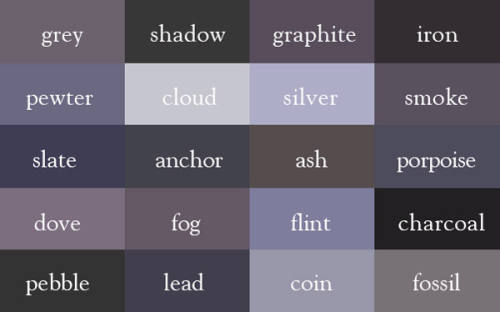
also: dust; stone; pepper;
Black

also: coal; slate; dusky; ebon; shadow; murky;
Tan

also: flesh; khaki; cream; tawny;
Brown

also: henna; russet; sepia; chestnut; cocoa; drab; bronze;
Red

also: terracotta ; rouge; carmine; fire-engine; ruddy
Orange

also: pumpkin ; rust ;
Yellow

also: sunny; amber; saffron; hay; straw; platinum;
Green

also: viridescent; grass; jade; forest;
Blue

also: turquoise; cyan; ultramarine; royal; aqua; aquamarine;
Purple

also: berry; amaranthine;
Pink

also: flushed; candy; cherry blossom; petal pink ;
—– source: http://ingridsundberg.com/
—–additional synonyms added by me
Quick Guide to Punctuating Dialogue
“This is a line of dialogue,” she said.
“This,” he said, “is a sentence split by a speech tag.”
“This is a full sentence,” she said. “This is a new sentence.”
“This is a sentence followed by an action.” He smiled. “They’re separate sentences, because I didn’t speak by smiling.”
Words to replace said, except this actually helps
I got pretty fed up with looking for words to replace said because they weren’t sorted in a way I could easily use/find them for the right time. So I did some myself.
IN RESPONSE TO Acknowledged Answered Protested
INPUT/JOIN CONVERSATION/ASK Added Implored Inquired Insisted Proposed Queried Questioned Recommended Testified
GUILTY/RELUCTANCE/SORRY Admitted Apologized Conceded Confessed Professed
FOR SOMEONE ELSE Advised Criticized Suggested
JUST CHECKING Affirmed Agreed Alleged Confirmed
LOUD Announced Chanted Crowed
LEWD/CUTE/SECRET SPY FEEL Appealed Disclosed Moaned
ANGRY FUCK OFF MATE WANNA FIGHT Argued Barked Challenged Cursed Fumed Growled Hissed Roared Swore
SMARTASS Articulated Asserted Assured Avowed Claimed Commanded Cross-examined Demanded Digressed Directed Foretold Instructed Interrupted Predicted Proclaimed Quoted Theorized
ASSHOLE Bellowed Boasted Bragged
NERVOUS TRAINWRECK Babbled Bawled Mumbled Sputtered Stammered Stuttered
SUAVE MOTHERFUCKER Bargained Divulged Disclosed Exhorted
FIRST OFF Began
LASTLY Concluded Concurred
WEAK PUSY Begged Blurted Complained Cried Faltered Fretted
HAPPY/LOL Cajoled Exclaimed Gushed Jested Joked Laughed
WEIRDLY HAPPY/EXCITED Extolled Jabbered Raved
BRUH, CHILL Cautioned Warned
ACTUALLY, YOU’RE WRONG Chided Contended Corrected Countered Debated Elaborated Objected Ranted Retorted
CHILL SAVAGE Commented Continued Observed Surmised
LISTEN BUDDY Enunciated Explained Elaborated Hinted Implied Lectured Reiterated Recited Reminded Stressed
BRUH I NEED U AND U NEED ME Confided Offered Urged
FINE Consented Decided
TOO EMO FULL OF EMOTIONS Croaked Lamented Pledged Sobbed Sympathized Wailed Whimpered
JUST SAYING Declared Decreed Mentioned Noted Pointed out Postulated Speculated Stated Told Vouched
WASN’T ME Denied Lied
EVIL SMARTASS Dictated Equivocated Ordered Reprimanded Threatened
BORED Droned Sighed
SHHHH IT’S QUIET TIME Echoed Mumbled Murmured Muttered Uttered Whispered
DRAMA QUEEN Exaggerated Panted Pleaded Prayed Preached
OH SHIT Gasped Marveled Screamed Screeched Shouted Shrieked Yelped Yelled
ANNOYED Grumbled Grunted Jeered Quipped Scolded Snapped Snarled Sneered
ANNOYING Nagged
I DON’T REALLY CARE BUT WHATEVER Guessed Ventured
I’M DRUNK OR JUST BEING WEIRDLY EXPRESSIVE FOR A POINT/SARCASM Hooted Howled Yowled
I WONDER Pondered Voiced Wondered
OH, YEAH, WHOOPS Recalled Recited Remembered
SURPRISE BITCH Revealed
IT SEEMS FAKE BUT OKAY/HA ACTUALLY FUNNY BUT I DON’T WANT TO LAUGH OUT LOUD Scoffed Snickered Snorted
BITCHY Tattled Taunted Teased
Writers: It’s Okay to Experiment and Be Weird As Fuck
With so much writing advice out there telling you what to do and not do, it can be easy to forget that writing is an art, and there are no rules in art.
Yes, learning about different writing techniques is great. Developing a language to talk and think about writing is important. Absorb everything you can. Reading, studying, and practicing are integral to improving your writing. Obviously, I run a writing blog, so I believe in the power of increasing your knowledge about writing and literature.
But don’t forget that, in the end, you can do whatever the hell you want to. Experiment. Have fun. Play. Follow your instincts. Break the “rules.” And don’t listen to anyone who says that no one wants to read weird, nontraditional writing. They do.
For most of my writing life, I’ve kept my crazy, experimental stories hidden away, because it seemed like anything I wrote that wasn’t a straightforward, traditionally-structured story with a main character and a plot wasn’t appreciated by readers. But guess what? One of my weird-as-fuck stories won second prize in a contest this fall, and when I asked the editors why they chose it, they said they liked it because it wasn’t like every other story in the submissions pile. It was different. It was weird. It took a risk. And for that reason it stood out from everything else they read.
It took me years to quiet the chorus of conformity and embrace my weird side. Don’t let that happen to you. Get wild. Write whatever you want. Do it now. We need freaks like you, or we’re all going to whither and die of boredom. Give us everything you’ve got. We need it. We need YOU.
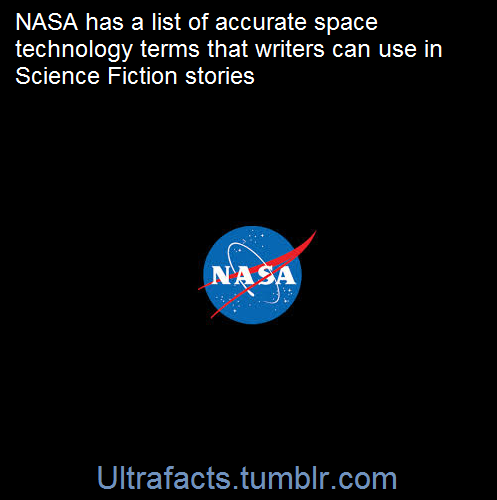
For any writers: http://er.jsc.nasa.gov/seh/SFTerms.html
For more facts, follow Ultrafacts
Useful Writing Resources
This is an extensive list of resources for every problem you could come across while writing/planning/editing your novel. Use it well;)
{ *** } Indicate a Highly Reccommended Resource

Planning/outlining Your Work
How To Outline ***
Zigzag Method : Creating Plots
How to Plot a Romance Novel
Seven Great Sources of Conflict for Romances
Let’s talk about brainstorming
Writing Something With Meaning ***
Past Or Present Tense? : How To Decide
Writing Your Work
How To Write A Fabulous Chapter #1 ***
How to Build a Romance Thread in Your Story
The Big Book Of Writing Sex ***
6 Ways to Get Your Readers Shipping Like Crazy
Romance Writing Tips ***
20 Tips for Writing Lovable Romance Novel Heroes
7 Ways To Speed Up Your Writing ***
80+ Barriers to Love: A List of Ideas to Keep Romantic Tension High
9 Romance Writing Mistakes to Avoid
Removing the Creeps From Romance
19 Ways to Write Better Dialogue ***
50 Things Your Characters Can Do WHILE They Talk ***
How To Write Action And Fight Scenes
10 Steps To Write Arguments
9 Ways To Write Body Language
Writing Good Kissing Scenes
Writing Murders
Create And Control Tone ***
Tips for Writing Ghost Stories
Incorporating Flashbacks
12 Tips To Avoid Overwriting ***
Characters
Behind the Name
Top Baby Names
Looking for a name that means a certain thing? ***
7 Rules of Picking Names
Most Common Surnames ***
Minor Character Development
Writing Antagonists, Antiheroes and Villains
Characters With Enhanced Senses
5 Tips to Help You Introduce Characters
How Do You Describe a Character?
How To Write Child Characters
36 Core Values For Building Character
Questions To Answer When Creating Characters ***
4 Ways to Make Readers Instantly Loathe Your Character Descriptions
5 Ways to Keep Characters Consistent
Character Archetypes
25 Ways To Fuck With Your Characters
Building Platonic Relationships Between Female Characters
9 Simple and Powerful Ways to Write Body Language
33 Ways To Write Stronger Characters
Conveying Character Emotion
How to Make Readers Love an Unlikable Character…
How to Create Powerful Character Combos
How To Describe A Character’s Voice ***
Describing Clothing And Appearance ***
Career Masterpost ***
Creating Your Character’s Personality ***
Character Flaws ***
Editing
DON’T EDIT>>> REWRITE THE WHOLE THING FIRST
Ultimate Guide To Editing Each Aspect Of Your Work ***
Why You Would Read Your Novel Out Loud ***
Grammar and Punctuation ***
How To Write A Captivating First Sentence
10 Things Your Opening Chapter Should Do: A Check-List for Self-Editing ***
Saving Your Story: Finding Where It Went Wrong
How To Condense Without Losing Anything
The Stages Of Editing
Dialogue/Description Balance
3 Proofreading Tips
The Short Story Form
Chapter & Novel Lengths
Anatomy Of A Novel : Chapters and Parts ***
How To Write Chapter After Chapter Until You Have A Book ***
Where Chapter #2 Should Start
Step By Step Guide To Editing Your Draft
Writing Tool: CTRL-F (How And Why You Should Use It) ***
How To Kill A Character
25 Steps To Edit The Unmerciful Suck Out Of Your Story
5 Ways To Make Your Novel Helplessly Addictive ***
Setting
{Setting} How To Describe Setting In Your Stories ***
20 Questions To Enhance Setting
How To Bring Your Setting To Life
Miscellaneous Resources You Can Use In Between
How to Write from a Guy’s POV
The Emotional Wounds Thesaurus
Text To Speech Reader
Compare Character Heights
A Visual Dictionary of Tops
Writers Helping Writers
7 Tricks To Imrove Your Writing Overnight
Work Out/ Word Count : Exercise Between Writing ***
Most Important Writing Tips ***
Let’s talk about diversity in novels
Letting Go Of Your Story
Keeping A Healthy Writing Schedule And Avoiding Procrastination ***
How To Create A Good Book Cover
Write or Die
Tip of my Tongue
Character Traits Form
Online Thesaurus
Writing Sketchy/Medical/Law
Coma: Types, Causes, etc
Tips for writing blood loss
Gunshot Wound Care
Examples of Hospital Forms
Common Legal Questions
The Writer’s Forensics Blog
Brain Injury Legal Guide
Types of Surgical Operations
Types of Mental Health Problems
A Day in the Life of a Mental Hospital Patient
Global Black Market Information ***
Crime Scene Science
Examining Mob Mentality
How Street Gangs Work
Writers’ Block Help/ Productivity
Story Plot Generator
@aveeragemusings ‘ Cure To Writers’ Block ***
50 Romance Plot Ideas
Reading Like A Writer ***
Defeat Writers’ Block
Writing In A Bad Mood ***
Writers Block
When You’ve Lost Motivation To Write A Novel ***
What To Do When The Words Won’t Flow ***
9 Ways To Be A More Productive Writer
“I Cannot Write A Good Sentence Today” (How To Get Over It) ***
Real Writing Advice ***
Info You Need To Know & Words You Didn’t Think Of
A Writer’s Thesaurus ***
Words To Describe… ***
Words & Phrases To Use In Your Sex Scenes ***
Colors (An Extensive List Of Colors)
List Of Kinks & Fetishes ***
List Of Elemental Abilities
inkarnate.com : World Creator And Map Maker For Your Imaginary Setting
Body Language Phrases
List Of Legendary Creatures
How To Write Magic
Hairstyle References
Hemingway : Writing Checker
Body Types: Words To Describe Bodies and How They Move Around
Poisonous Herbs and Plants ***
The Psychology of Color
The Meaning behind Rose color
Types of Swords
Color Symbolism
How a handgun works
How to Write a Eulogy
Types of Crying
Avoiding LGBTQ Stereotypes ***
Superstitions and More
The 12 Common Archetypes
Language of Flowers
12 Realistic Woman Body Shapes
Using Feedback And Reviews
Turning Negative Reviews Into Positive Ones ***
Proofreading Marks : Easy Symbols To Make Reviewing/Feedback Easier ***
Authonomy Teen Ink Figment Fiction Press ReviewFuse
These Are Trusted Critique Sites ;)

128 Words to Use Instead of ‘Very’
In Which Diversity Isn't a Myth
Ok. I’m tired of the typical vampire, werewolf and fairy.I’m also tired of the occidental-centrism in mythology. Hence, this list.
I tried to included as many cultural variants as I could find and think of. (Unfortunately, I was restricted by language. Some Russian creatures looked very interesting but I don’t speak Russian…) Please, add creatures from your culture when reblogguing (if not already present). It took me a while to gather all those sites but I know it could be more expansive. I intend on periodically editing this list.
Of note: I did not include specific legendary creatures (Merlin, Pegasus, ect), gods/goddesses/deities and heroes.
Dragons
The Chinese Dragon
The Japanese Dragon
The Korean Dragon
The Vietnamese Dragon
The Greek Dragon
The Indian Dragon
The Polish Dragon
The Austrian Dragon
The British Dragon
The Ancient Dragon (Egypt, Babylon and Sumer)
The Spanish Basque Dragon
Of the Cockatrice (creature with the body of a dragon)
Alphabetical List of Dragons Across Myths (Great way to start)
Little creatures (without wings)
The Legend of the Leprechauns, The Leprechaun
Chanaque /Alux (the equivalent of leprechauns in Aztec/Mayan folklore)
Elves
Elves in Mythology and Fantasy
Elves in Germanic Mythology
Kabeiroi or Cabeiri (Dwarf-like minor gods in Greek mythology)
Norse Dwarves
The Myth of Loki and the Dwarves
Ten Types of Goblins
Goblins
Tengu: Japanese Goblins
Gnomes
More on Gnomes
Pooka: an Irish phantom
Creatures with wings (except dragons)
Fairies
All sorts of Cultural Fairies
Fairies in Old French Mythology
A Fairy List
Bendith Y Mamau (Welsh fairies)
Welsh Fairies
Peri (Persian fairies)
Yü Nü (Chinese fairies)
The Celtic Pixie
Angels in Judaism
Angels in Christianity
Hierarchy of Angels
Angels in Islam
Irish Sylph
Garuda (Bird-like creature in Hindu and Buddhist myths)
Bean Nighe (a Scottish fairy; the equivalent of a banshee in Celtic mythology)
Harpies
Spirited Creatures
Druids
Jinn (Genies in Arabic folklore)
Types of Djinns
Aisha Qandisha and Djinn in Moroccan Folklore
Oni (demons in Japanese folklore)
Nymphs
Spirits in Asturian Mythology
Valkyries
Lesovik
Boggarts: The British Poltergeist
Phantom black dogs (the Grim)
Demons in Babylonian and Assyrian Mythology (list)
Demons in the Americas (list)
European Demons (list)
Middle-East and Asia Demons (list)
Judeo-Christian Demons (list)
Nephilim, more on Nephilim
Mahaha (a demon in Inuit mythology)
Flying Head (a demon in Iroquois mythology)
Ghosts
Toyol (a dead baby ghost in Malay folklore)
Malay Ghosts
Yuki-onna (a ghost in Japanese folklore)
The Pontianak (a ghost in Malay mythology)
Funayurei (a ghost in Japanese folklore)
Zagaz (ghosts in Moroccan folklore)
Japanese Ghosts
Mexican Ghosts
Horse-like mythical creatures
Chinese Unicorns
Unicorns
The Kelpie (Could have also fitted in the sea creatures category)
The Centaur
The Female Centaur
Hippocamps (sea horses in Greek mythology)
Horse-like creatures (a list)
Karkadann, more on the Karkadann (a persian unicorn)
Ceffyl Dwfr (fairy-like water horse creatures in Cymric mythology)
Undead creatures
The Melanesian Vampire
The Ewe Myth : Vampires
The Germanic Alp
The Indonesian Vampire
Asanbosam and Sasabonsam (Vampires from West Africa)
The Aswang: The Filipino Vampire
Folklore Vampires Versus Literary Vampires
Callicantzaros: The Greek Vampire
Vampires in Malaysia
Loogaroo/Socouyant: The Haitian Vampire
Incubi and Sucubi Across Cultures
Varacolaci: The Romanian Vampire
Brahmaparusha: The Indian Vampire
Genesis of the Word “Vampire”
The Ghoul in Middle East Mythology
Slavic Vampires
Vampires A-Z
The Medical Truth Behind the Vampire Myths
Zombies in Haitian Culture
Shape-shifters and half-human creatures (except mermaids)
Satyrs (half-man, half-goat)
Sirens in Greek Mythology (half-woman and half-bird creatures)
The Original Werewolf in Greek Mythology
Werewolves Across Cultures
Werewolf Syndrome: A Medical Explanation to the Myth
Nagas Across Cultures
The Kumiho (half fox and half woman creatures)
The Sphinx
Criosphinx
Scorpion Men (warriors from Babylonian mythology)
Pooka: an Irish changelings
Domovoi (a shape-shifter in Russian folklore)
Aatxe (Basque mythology; red bull that can shift in a human)
Yech (Native American folklore)
Ijiraat (shapeshifters in Inuit mythology)
Sea creatures
Selkies (Norse mermaids)
Mermaids in many cultures
More about mermaids
Mermen
The Kraken (a sea monster)
Nuckelavee (a Scottish elf who mainly lives in the sea)
Lamiak (sea nymphs in Basque mythology)
Bunyip (sea monster in Aboriginal mythology)
Apkallu/abgal (Sumerian mermen)
An assemblage of myths and legends on water and water creatures
Slavic Water Creatures
The Encantado (water spirits in Ancient Amazon River mythology)
Zin (water spirit in Nigerian folklore)
Qallupilluk (sea creatures in Inuit mythology)
Monsters That Don’t Fit in Any Other Category
Aigamuxa, more details on Aigamuxa
Amphisabaena
Abere
Bonnacon
Myrmidons (ant warriors)
Troll, More on Trolls
Golems
Golems in Judaism
Giants: The Mystery and the Myth (50 min long documentary)
Inupasugjuk (giants in Inuit mythology)
Fomorians (an Irish divine race of giants)
The Minotaur
The Manticore, The Manticore and The Leucrouta
The Ogre
The Orthus (two-headed serpent-tailed dog)
The Windigo
The Windigo Psychosis
Rakshasa (humanoids in Hindu and Buddhist mythology)
Yakshas (warriors in Hindu mythology)
Taqriaqsuit (“Shadow people” in Inuit mythology)
References on Folklore and Mythology Across the Globe
Creatures of Irish Folklore
Folklore and Fairytales
An Overview of Persian Folklore
Filipino Folklore
Myths, Creatures and Folklore
Alaska Folklore
Spanish (Spain) Mythology
Mythical Archive
Mythology Dictionary
List of Medieval and Ancient Monsters
Native American Animals of Myth and Legends
Native American Myths
Bestiary of Ancient Greek Mythology
Mythology, Legend, Folklore and Ghosts
Angels and Demons
List of Sea Creatures
Yoruba Mythology
Ghosts Around the World, Ghosts From A to Z
Strange (Fantastic) Animals of Ancient Egypt
Egyptian Mythology
Creatures from West Africa
On the Legendary Creatures of Africa
Myths, Creatures and Folklore
References on writing a myth or mythical creatures
Writing a MYTHology in your novel?
How to Write a Myth
10 Steps to Creating Realistic Fantasy Creatures
Creating Fantasy Creatures or Alien Species
Legendary Creature Generator
Book Recommendations With Underrated Mythical Creatures
(I have stumbled upon web sites that believed some of these mythical creatures exist today… Especially dragons, in fact. I just had to share the love and scepticism.)
someone in a fanfic: s-stutters in embarrassment
me, closing the tab: sorry I must go
Character Tip
Realistic characters have contradictions. Exceptions to rules. Maybe they’re mostly nonviolent, but they’ll punch you if you insult their friend. Maybe they’re afraid of spiders, but aren’t afraid to kill a spider for their younger sibling.
In short, don’t be afraid to have characters who can’t be defined by a character fact sheet.
Writing a bilingual character: tips
(This is from my own personal experience as a Chinese person who’s better at English, my “first” language, than Chinese, my “second” language.)
When your character is going speak unintentionally in their second language instead of their first one: • When they’re tired, they could slip up and accidentally start a sentence with their second language. Generally, though, they realise and correct themselves before finishing the sentence • When they were just thinking in their second language/ talking to someone in their second language. The shift from one language to the other is where they could get caught up • If they were startled, after just speaking/thinking in their second language.
Keep in mind though, that people very experienced in both languages will probably not be tripped up as often. Your character who has been speaking their second language for 10 years is going to trip up a lot less than your character who’s only known their second language for 5 years.
Unrealistic scenarios: • Slipping into their second language in the middle of a sentence accidentally, unless they forgot a word they needed to use Unrealistic: “Ok so you’re going to go down the hall and— 他妈的! I forgot my homework on my desk! Gotta run and get it” (The Chinese is a swear) Realistic: “We’re going to need a… 车? What do you guys call that again?” (The Chinese character is the one for car)
• Suddenly saying something in their second language, when they were just conversing in their first language. There’s a mental switch you need to make when changing from a conversation in one language to a conversation in another which makes those situations pretty unlikely. Person 1: “Could you send the powerpoint to me?” Person 2: “Just did that. Did you get the email yet?” Person 1: “我– oh whoops. Sorry! Yeah, I just got it” (Chinese character is the character for “I”)
Bilingual things you could include in your writing: • Thinking in one language when doing one specific thing. For instance, I almost always do Maths in Chinese. The whole structure of the language and how the words for numbers work out means it’s a lot easier in Chinese than English.
• A conversation that’s a mess of two languages all mashed together. Frankenlanguages. As stated before, I’m personally better at English than Chinese. So, when I’m speaking in Chinese, it’s often with English words interspersed throughout when I forget the Chinese word. In that case, there is no mental shift between languages needed. Instead, you pull from both languages at once. Ex: “我今天在学校的时候跟我的 Chemistry 老师 discuss 我的essay on the effects of acid rain on 咯房的 roofs.” (Translation: today, at school, my Chemistry teacher and I discussed my essay on the effects of acid rain on the roofs of buildings.)
• Your character could speak one language at home and another language when at work/school/with friends. For example, I speak Chinese when I’m at home with my Chinese family and I speak English everywhere else because I live in Canada. This makes for interesting situations where, even though I am highly proficient in English, I lack some basic vocabulary. What is a blouse? Not really sure to be honest. I used to get “dress” and “skirt” confused a lot because I only used Chinese to refer to those things and thus never built up my English vocabulary in those areas. I’ve had to awkwardly describe the fruit I was looking for in stores before because I didn’t know the English name for it.
Anyway, if you need help with writing a bilingual character, feel free to shoot me an ask!
Random Writing Tips (So Far)
Write a Person First
Write for Fun
Rules? You Mean “Guidelines”?
Literary Theory Basics Resources
Character Names Matter
Art for Art’s Sake?
Character Development Exercise
Research Tips!
Learning from Others Without Comparing
Trouble Writing Descriptions?
Observe the World Around You
On Keeping Continuity in Character Development
On the Chosen One
The Editing Agenda: Those Darn Dashes

When it comes to formatting and punctuation issues, hyphens and dashes take the cake. Their use in books is incredibly inconsistent, which leads to a lot of confusion for anyone trying to learn them. This article will give a thorough breakdown of each kind and their uses as they pertain to fiction. Keep in mind that the rules I’m covering are the ones that are the most beneficial for fiction writing—there are some that won’t be addressed in this post. And all rules mentioned are based on The Chicago Manual of Style, 16th Edition.
Hyphens
Phrasal Adjectives
Phrasal adjectives are a short group of words (usually two but sometimes three or more) that link together to modify another noun. They typically precede the noun and are very common in fiction writing.
Example 1: rose-colored glasses
Example 2: four-chambered heart
A fantastic resource for this can be found on The Chicago Manual of Style website: http://www.chicagomanualofstyle.org/16/images/ch07_tab01.pdf
This chart shows you the breakdown of various combinations of adjectives and how they should be punctuated, including permanently hyphenated words and exceptions. The CMOS advises following Merriam-Webster’s dictionary for determining which words and phrases should always be hyphenated. Some of examples of this are the words life-form, run-down (not to be confused with rundown, which holds a different meaning), and short-lived.
Compound Name
Hyphens are also used for compound names, including surnames, first names, and other names.
Example 1: Merriam-Webster
Example 2: Mary-Kay
Example 3: Theta-Gamma
Word Division
The most common word division breaks where you’d find hyphens would be line breaks, syllable breaks (often used for pronunciation purposes), and prefixes and suffixes. Which isn’t all that common in fiction writing. However, you will often see it in dialogue, particularly with stuttering.
Example: “W-w-where’d you l-l-leave it?” Tom asked.
Separators
Hyphens can also be used to separate letters and numbers. That’s that type of thing you see with phone numbers, ID numbers, and the like. However, a great use for separation hyphens in fiction writing if when have a word that you need to spell out completely or partially.
Example: The sign read: “C-A-U-T.” The rest had long worn off.
En Dashes
Dates, Times, and Page Numbers
The en dash’s main purpose is to replace the word to. The most typical occurrence of this would be with dates, times, and page numbers.
Example 1: He held office from 1929–1932.
Example 2: The event is Saturday, 2:30p.m.–4:30p.m.
Example 3: Tonight’s assignment is to read pages 32–45.
You also might see this with scoring/votes and with an unfinished number range.
Example 4: We won our last game 13–2.
Example 5: The magazine (2003–) has produced six volumes so far.
However, you should always use the word “to” instead of an en dash if “from” precedes the range.
Example 6: He joined us from 11a.m. to 12p.m. but had to leave for lunch after that.
Directions and Compound Adjectives
En dashes are also sometimes used with words, as can be the case with directions.
Example 1: I took the London–Paris train last week.
And sometimes—very rarely—an en dash is used with compound adjectives. This is where it gets tricky because the intended meaning can often get muddled by using this method, so it’s usually best to reword and find a more elegant solution when possible.
Example 2a: I’d like to find more Taylor Swift–style music.
Example 2b: I’d like to find more artists like Taylor Swift.
Version 2b of the above example flows much better and is less confusing than the first, so it’s definitely the better choice.
And with two sets of compound adjectives where the sets are acting as coordinate adjectives to each other, a comma is the best option.
Example 3: This run-down, high-maintenance property will end up costing a lot of money.
Universities
The last use of en dashes is one that you probably won’t find in most fiction writing, but it’s useful to know nonetheless. You will sometimes find universities with multiple campus locations using an en dash to include the location name.
Example: I put my application in for Fordham University–Westchester.
Em Dashes
Em dashes are used to set off phrases and clauses in a manuscript that require an abrupt break, either to draw attention to it or because there is a large shift in the train of thought. This is one of the most useful tools an author has in fiction writing when it’s used correctly and sparingly. Note that em dashes should NOT be substituted with ellipses; the two serve different purposes.
Em Dashes vs. Ellipses
Em dashes are used for interruption or to set off an explanatory element. An ellipsis is used to indicate hesitation or trailing off.
Example 1: “Lucy, where did you put—”
“It’s none of your business!” Lucy shouted from the other room.
Example 2: I stumbled down the stairs—the power had gone out earlier that evening—before I found my way to the bathroom.
Example 3: “I don’t know…” I admitted. “I hadn’t really thought much about it.”
Interrupted Thoughts
Sometimes the interruptions can come in the form of narrative thoughts.
Example: Justin’s feet pounded against the ground as he blazed down the trail. Awesome. If he kept up the pace, he’d beat—a tree root caught his foot, and he was sent sprawling into the dirt.
And if you have a character that is having trouble forming a sentence due to the circumstances at hand and/or heighted emotions, em dashes can be used to indicate stammering between words (not syllables).
Example: “What I meant was—why can’t we—oh, just forget it,” Julie spat out.
Words and Phrases
An em dash can also be used to set off noun or pronoun at the beginning of the sentence.
Example: Cowards—they were the ones who sought power.
Another common use for the em dash is before the phrases “namely,” “that is,” “for example,” and others similar to those.
Example: We spent most of the afternoon in the garden—that is, until the heat got to be unbearable.
Note: You should never use em dashes within or immediately following an element that already has a set of em dashes. Not only would this look terrible aesthetically, but it could also cause potential misinterpretation.
Interrupted Dialogue
The last use of em dashes for fiction is probably one of the trickiest, but it can also be the most useful. If you have a line of dialogue that is split up by an action in the middle, you can use em dashes to set off that action.
Example 1: “Well, the thing is”—Tommy quickly turned his attention to his feet—“it’s just not working out between us.”
Note that the em dashes go outside of the quotation marks in such a case, and the quotation is a continuous line of dialogue that is being split. The first word of the dialogue after the split should be lowercase. You can’t use this method if you have two separate sentences that have an action in between. In that situation, you’d use periods.
Example 2: “You really mean it.” I could hear my voice catch in my throat. “I just don’t understand what happened.
Two-Em Dash
One type of em dashes that is not commonly used in fiction writing that is probably my favorite is the 2-em dash. The 2-em dash is used to omit words or parts of words that are missing or illegible, or to conceal a name. Two em dashes are most useful for the genres of fantasy, thriller, and mystery, where characters might come across documents that have damage to them. The example below is from a snippet of a work in progress of mine: book one of the Ansakerr series.
My dearest I——,
If you are reading this, I have long since p—— away. I can only pray that my —— box and this letter have fallen into your hands and your hands alone. There is much you have yet learn to about me. There is still a D——k O—— out there, one more dangerous than you can imagine. For now, you are protected, but be on your toes, my girl. One day soon, I fear the p—— will fade, and you’ll need to be ready. He is coming.
The key will lead you to A——. It will hold the answers you’re looking for.
Deepest love and affection,
Grandma Bea
Notice that most of the missing parts are for key elements, including names, places, and very specific items that are clearly key for the plot. If you craft these parts well, you can purposely mislead a reader in the narrative, giving a bit of a twist to your story.
Formatting and Stylistic Use
No spaces should be used around hyphens or dashes except in the case of the 2-em dash when it is being used to completely omit a word. This is probably the most common error regarding formatting of hyphens and dashes that I come across. Though there is some debate about spacing among various sources, the CMOS is pretty clear about it. But again, as with anything else in writing, consistency is the most important.
As for formatting the different dashes, mainstream word processors include symbols for each that you can insert into your document. In fact, some of them even automatically convert two hyphens used together into an em dash. While most publishers will accept em dashes in the form of two hyphens (in fact, some even request that you submit manuscripts that way), when it comes to actual printing and online publishing of the material, you’ll want to make sure they’re replaced. Your document will look more professional when you use the correct symbol, and your readers will likely notice as well.
Tip: To quickly find and replace any stray instances of two hyphens with an em dash symbol, use your word processors Replace function.
Lastly, when it comes to use with other punctuation, a question mark or an exclamation mark can precede an em dash, but never a comma, colon, or semicolon. In other words, if you use an em dash where one of the latter punctuation marks would typically be used, the dash takes the place of the punctuation.
Example: He bent down to tie his shoe—but he stopped when he saw Alyssa approaching.
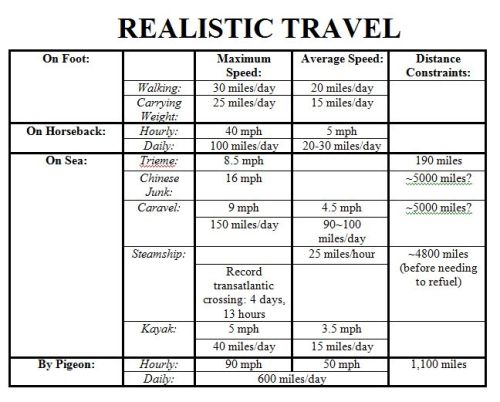
Here’s an invaluable writing resource for you.
Reactions to tragedy
In real life, pretty much everybody reacts to tragedy differently. So why is it that every author has their pet reaction to tragedy that all their characters use? Not only is it unrealistic, but it takes away the chance for the characters’ different reactions to reveal things about themselves.
Possible reactions to tragedy (not an exhaustive list):
Distracting oneself with mindless activities
Distracting oneself with others’ humor
Distracting oneself by making jokes
Distracting oneself by reading/watching/playing stories
Distracting oneself with hard mental work
Distracting oneself with hard physical work
Distracting oneself with creative endeavors
Distracting oneself by chatting with friends about normal things
Talking to friends about the tragedy
Talking to authority figures about the tragedy
Talking anonymously with strangers about the tragedy (if possible)
Getting wrapped up in others’ problems
Staying unusually silent
Screaming
Crying loudly
Crying silently
Doing everything possible not to cry
Pacing
Taking unhealthy risks
Going for revenge against whoever one can blame
Punching random objects
Throwing random objects
Lashing out against friends and family members
Trying to prevent a similar tragedy from happening
Eating more than usual
Not eating
Taking mind-altering substances
Getting in unhealthy relationships
Isolating oneself
Obsessing over routine
Numbness combined with apathy
Numbness combined with going through one’s normal motions
Trying to get things back the way they were
Denial
No reaction at first but a reaction hits later in greater force
No reaction at all. Emotions relating to the tragedy just fail to load. Note that this can happen to anybody and does not mark a character as a sociopath.
Characters can have more than one reaction at the same time, one reaction after another, or different reactions to different tragedies.
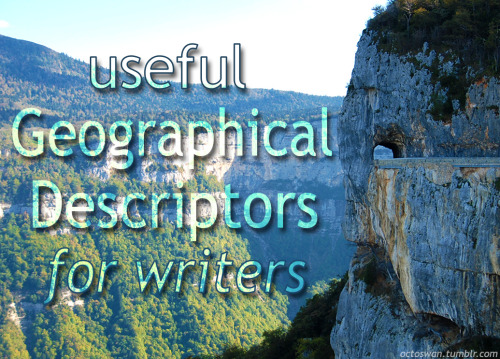


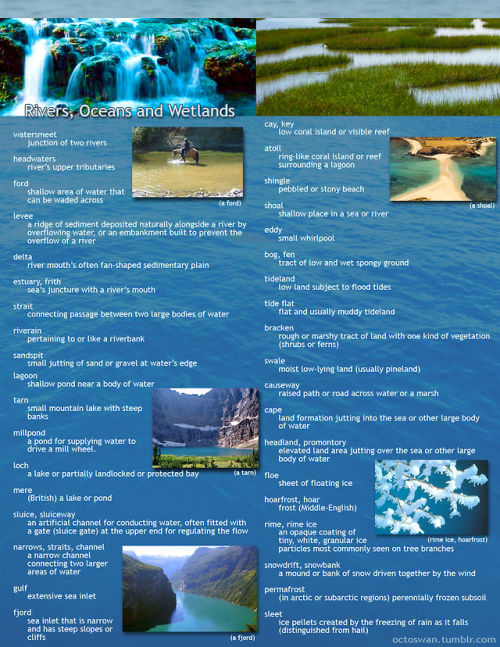

I made these as a way to compile all the geographical vocabulary that I thought was useful and interesting for writers. Some descriptors share categories, and some are simplified, but for the most part everything is in its proper place. Not all the words are as useable as others, and some might take tricky wording to pull off, but I hope these prove useful to all you writers out there!
(save the images to zoom in on the pics)
Writing a Relationship Your Readers Will Ship
Relationships, especially in beginner writer’s works, have a tendency to feel forced. Even in some popular and famous works of fiction, the relationship doesn’t feel natural. It seems like a boring afterthought which the writer added in at the last minute. Far too often, I find myself completely indifferent to a character’s romantic life. A good romance in a story will give the reader a bit of second-hand infatuation. They’ll root for the relationship, beg for it. If the romance is well written, you can make a reader smile and blush just by reading a few sentences. When done properly, it can even compensate for a weak and cliché plot.
But first, decide whether the romance is needed. If you’re adding a character to the plot simply for the sake of being a love interest, it’s probably not a needed romance. You can still add it, of course, but it will be much harder to keep your story focused on the central plot.
Step One Make sure the characters have chemistry.
The characters should compliment each other’s personalities. If he’s loud, stubborn, and aggressively opinionated, a more tranquil and soft-spoken love interest would suit him well. Two headstrong people wouldn’t be likely to have a lasting relationship in real life, unless they (impossibly) agreed upon every subject. But, there should be some similarities. While opposites do attract, polar opposites will not and the whole relationship will feel forced. The characters should have something in common. It could be morals, a parallel backstory, the same motivations, whatever. As long as there’s a reason for them to be drawn to each other, there’s potential.
Step Two Slow burn ships are fantastic.
Don’t make your characters fall in love right off the bat. There can be attraction, of course, but genuine feelings of true love don’t happen instantly. Your characters should become closer as people, feel at ease around each other, and truly know the other before they fall head-over-heels. The readers will crave the relationship far more, like dangling a treat right in front of a dog’s nose, but keep pulling it away. Teasing is a beautiful thing.
Find ways of showing (NOT TELLING) the characters are falling for each other. Have them stand up for one another, be protective. Have them break their own normal routine for the other. For example, a callous, guarded character could lower their walls for a moment if their love interest needs emotional support. These scenes can be awkward for the character changing their typical behavior and that discomfort can demonstrate how much they care for the other, altering their own selves for the other’s benefit.
Howeve, make sure that you combine these cute emotional moments with distance. Make the characters deny their true feelings or even distance themselves from their love interest upon discovering their feelings. The more the characters long for each other, the more the reader will long for them to be together. Build barriers between them for your characters to have to work to knock down. Keep them close, but maintain that distance until the moment is right.
Step Three “_____” translates to “I love you”
The first example of I think of when I think of this is The Princess Bride, where the male protagonist tells his soulmate “as you wish” when he really means “I love you.”
This falls under the category of show, don’t tell. Hearing a character say “I love you” has become so boring. Unless it’s done in a surprising confession or unique way, it’s boring and stale.
Come up with a phrase that you can repeat in moments throughout the story until it has a meaning of love for the characters and both know exactly what the other means when it’s spoken.
Step Four Taking a break can help create tension.
You know you loved someone if you leave them and feel awful. Apply this into the writing. Your characters can break up, then get back together in a joyous reunion.
Step Five Not every couple has a happy ending.
Sometimes, things don’t always work out for different reasons. An ending that leaves readers craving more can be a good move.
This is a message to all artists and writers across Tumblr.
You. You, are amazing. You’ve written things for friends, for yourself and for Tumblr - yet I feel you don’t get enough credit. If you had commissions up - I wouldn’t even want anything. I’d just give you the money if I had it. Why? The work you put in your work. Like accidentally erasing the wrong layer - or even deleting a whole layer. Accidentally deleting a page of your writing or forgetting to save it after writing for hours. The woes of art will get to you - but you’ve put hours, days, weeks, months and even years into your masterpiece. And for that? I both envy you and love you. Keep being amazing and incredible and I hope you continue to spread joy for years to come.
PLEASE, PLEASE STOP SCROLLING.
BOOST, BOOST, BOOST! Especially if you don’t live in the U.S., because that’s all you can do to help us.
If you DO live here, this post has 5 things you can do; feel free to skip to the bullet points.
I’m sure you’re sick of seeing this, but we are in the final stages of the Net Neutrality repeal. I know long posts about this can be overwhelming, so at least just pick a bullet point and do it! HOPE IS NOT LOST YET.
WE STILL HAVE ONE LAST CHANCE — Until April 27th
There’s a CRA (Congressional Review Act) vote to get Net Neutrality back, and it may still win. THIS IS BECAUSE OF US!!! Enough people in congress listened to our calls, emails, and tweets, so a CRA has been called for to try and stop Ajit Pai.
Long posts about this can be overwhelming, so I’ll keep it simple and just list some quick and easy options below for how you can help save it. WE’VE ALREADY MADE PROGRESS, KEEP GOING! WE’RE SO CLOSE! I’m lucky enough to have the ability to do these, so I’m doing all of them, even though it’s hard for me. Do it for the people who can’t. Do it for those who will LOSE THEIR JOBS or their educations or their friends or their support. Do it for the kids too young to use a phone. Do it for the families who might be put out of homes. Do it for everyone.
WE NEED ONE MORE SENATE VOTE. DO AT LEAST ONE OF THESE 5 THINGS IF YOU’RE PHYSICALLY CAPABLE
[Info and Resources for Action]
FIRST OFF, if you don’t know what to say, here are some basic templates as well as my own that have had an effect in the past.
For your Senator’s contact info (phone/email/twitter/etc): http://act.commoncause.org/site/PageServer?pagename=sunlight_advocacy_list_page
[Action to Take]
KEY: bold = most important, *** = quickest/easiest to do
Here you can write anything and they’ll email it around: https://www.battleforthenet.com/
*** OR just scroll down and click a Senator to tweet them.
*** Just type your zip code here, and it’ll email/tweet your Senators! https://www.publicknowledge.org/act-now/tell-congress-to-use-the-cra-to-save-net-neutrality/#anchor
Text RESIST to 50409 (reply Senate, then copy any of the templates or write your own) — it’ll automatically email/fax it
*** Reblog, Retweet, and tell people as much as possible! But that alone isn’t enough. Get your friends/family/classmates to do these, too!!!
If you can do this last one, if you’re at all able, do it.
Call the Capitol at 202-224-3121. Just say where you’re from and they’ll transfer you to your senator’s office. Here’s a template for what to say:
“Hello, I’m [name], and I’m a constituent of Senator [name]. I’m calling to urge them to vote in support of net neutrality, as it is very important to the general public. I am watching their actions on net neutrality, and it will influence my vote in coming years. Thank you!”
(This also works as a great template for tweets/emails to your Senators)
Side Note: You can go here to see how many calls each of your Sen/Reps have already received: https://www.battleforthenet.com/scoreboard/ – it’s cool to see that a lot of calls CAN AND HAVE change(d) the vote!
THIS IS 2018 — WE CAN VOTE THEM OUT THIS YEAR AND THEY KNOW IT. USE THAT LEVERAGE.
WriterofthePrompts Ultimate Ask Masterlist 2
Wow, first of all I just want to say THANK YOU SO MUCH for all the support on the First Ask Masterlist! Obviously I had to make a second one with all the asks I’ve answered since then so here you go. As last time, some of these posts have notes from lovely people who have added onto my answers with their advice and you can also help out fellow writers by adding your tips or ideas to the posts in the replies or by reblogging. Hope you enjoy! 😊
Writing Tips
Writing unnecessary scenes with your characters just for fun
The “organized chaos” form of outlining
Resources for writing a story synopsis
Can a comedy also have a good message?
Writing a fantasy fit for most ages (also under Fantasy)
When you’ve got an idea but don’t know how to expand it
Building on your story yourself
Will posting writing online hurt publishing chances?
Using a prompt for a series
Story Structure Tips
Travelling scenes: when to skip and how to make them impactful
Moving back and forth in time in the story
difference between inciting incident and plot point 1
Blending backstory with present to further the plot
Writing scenes with a lot of characters
Writing a story as a journal or video log style
Third or first person?
Motivation and Positivity
Worrying about “originality” with your writing
Staying focused on writing
Turning off the editor voice
starting to write and keeping motivation
quick tip on writing down inspiration in the moment
Character Development
Tips for writing a fully-fledged peppy girl
Teen raised by twenty-year-old family member
Mentor/Mentee relationship
Describing nature the way a nature-lover would
Showing a dead family member’s impact on the MC
Writing about a character losing loved one
Ways to give information to a character
Why the “White Saviour” thing is a cliche and sucks
Villains who do things like “killing the dog”
Good and bad reasons to kill off a character
Writing Types of Characters
Writing a good guy MC who turns out to be the villain
Bad guy turning good and making them sympathetic
Dr. Doof: how to write a great villain
A character raised by a computer
Bilingual character tip
Interracial couples
Some negative traits for someone in a zombie apocalypse
a character trying to learn the language on a new world (also under World Building)
Good guy vs bad guy stories aren’t a cliche
Writing a CIA/FBI/Military character (also under Thriller)
writing a drunk character with some heartfelt moments and humour
World Building
Creating a creation myth
History research post
Making an acronym from an organization
strange weather ideas
ideas for ridiculous rules to join an excuse club
Why someone would put on a massive tournament
a character trying to learn the language on a new world (also under Types of Characters)
Fantasy/Paranormal
Why gods would abandon their world
Aphrodite, Hephaestus and Ares: the original love triangle
basing gods on multiple gods
Why someone would control dreams
Dark fantasy with a dream shop
Writing a fantasy fit for most ages (also under Writing Tips)
Vampire and human couple meeting
Angel and ex-demon hanging out together
Ways to break the curse to get the Prince out of the tower
Prince/ss of one kingdom raised by another king
why a princess would run away
which fairytales deserve retellings
mythical kids meeting humans
Sword fight resources
demons that feed on love and joy?
Haunted house story from ghost’s perspective
Does the afterlife have to include religious aspects?
Thriller/Crime (aka I-swear-I’m-not-a-criminal-just-a-writer asks):
writing assassins
Clues that would make a character suspect another for murder
Writing a CIA/FBI/Military character (also under Types of Characters)
Serial/mass murder…causes?
Quick reasons why genocide doesn’t just happen
tests to get into secret organization
Superheroes
Sidekick wanting to be a superhero
Super villain cause ideas
Sidekick and villain falling in love (also under Romance)
Superhero story originality
Romance
How a princess and a pirate fall in love
two exes who end up working together
How two random kids could meet at school
Sidekick and villain falling in love (also under Superheroes)
Miscellaneous
Prompts about being abandoned
Character who has never danced in pressured into it
Futuristic space pirates
The best ask ever
self-editing for fiction writers
Showing vs Telling
Do you have any narrative summary, or are you bouncing from scene to scene without pausing for breath?
Characterization & Exposition
What information do your readers need in order to understand your story? At what point in the story do they need to know it?
How are you getting this info across to your readers? Is it all at once through a writer-to-reader lecture?
If exposition comes out through dialogue, is it through dialogue your characters would actually speak even if your readers didn’t have to know the information? In other words, does the dialogue exist only to put the information across?
Point of View
Look at your descriptions. Can you tell how your viewpoint character feels about what you’re describing?
Proportion
Look at descriptions. Are the details you give the ones your viewpoint character would notice?
Reread your first fifty pages, paying attention to what you spend your time on. Are the characters you develop most fully important to the ending? Do you use the locations you develop in detail later in the story? Do any of the characters play a surprising role in the ending? Could readers guess this from the amount of time you spend on them?
Dialogue
Can you get rid of some of your speaker attributions entirely? Try replacing some with beats.
How often have you paragrapher your dialogue?Try paragraphing a little more often.
See How it Sounds
Read your dialogue aloud. At some point, read aloud every word you write.
Be on the lookout for places where you are tempted to change the wording.
How well do your characters understand each other? Do they ever mislead on another? Any outright lies?
Interior Monologue
First, how much interior monologue do you have? If you seem to have a lot, check to see whether some is actually dialogue description in disguise. Are you using interior monologue to show things that should be told?
Do you have thinker attributions you should get rid of (by recasting into 3rd person, by setting the interior monologue off in its own paragraph or in italics, or by simply dropping the attribution)
Do your mechanics match your narrative distance?(Thinker attributions, italics, first person when your narrative is in third?)
Easy Beats
How many beats do you have? How often do you interrupt your dialogue?
What are your beats describing? Familiar every day actions, such as dialling a telephone or buying groceries? How often do you repeat a beat? Are your characters always looking out of windows or lighting cigarettes?
Do your beats help illuminate your characters? Are they individual or general actions anyone might do under just about any circumstances?
Do your beats fit the rhythm of your dialogue? Read it aloud and find out
Breaking up is easy to do
Look for white space. How much is there? Do you have paragraphs that go on as much as a page in length?
Do you have scenes with NO longer paragraphs? Remember what you’re after is the right balance.
Have your characters made little speeches to one another?
If you’re writing a novel, are all your scenes or chapters exactly the same length? -> brief scenes or chapters can give you more control over your story. They can add to your story’s tension. Longer chapters can give it a more leisurely feels. If scene or chapter length remains steady while the tension of the story varies considerably, your are passing up the chance to reinforce the tension.
Once is usually enough
Reread your manuscript, keeping in mind what you are trying to do with each paragraph–what character point you’re trying to establish, what sort of mood you’re trying to create, what background you’re trying to suggest. In how many different ways are you accomplishing each of these ends?
If more than one way, try reading the passage without the weakest approach and see if it itsn’t more effective.
How about on a chapter level? Do you have more than one chapter that accomplishes the same thing?
Is there a plot device or stylistic effect you are particularly pleased with? How often do you use it?
Keep on the lookout for unintentional word repeats. The more striking a word or phrase is, the more jarring it will be if repeated
Sophistication
How many -ing and as phrases do you write? The only ones that count are the ones that place a bit of action in a subordinate clause
How about -ly adverbs?
Do you have a lot of short sentences, both within your dialogue and within your description and narration? Try stringing some of them together with commas